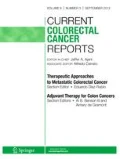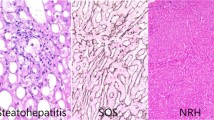Abstract
Modern oncosurgical strategies are producing dramatic response rates and remarkable long-term survival rates for patients with hepatic colorectal cancer metastases. However, the increasing delivery of preoperative systemic chemotherapy to patients has coincided with recognition of possible chemotherapy-associated injury to the nontumoral liver. Although multiple groups have described gross changes in the appearance of the liver following systemic chemotherapy, the exact histopathologic lesions have not been clearly defined. A review of the literature on the topic indicates that host factors (eg, diabetes mellitus, obesity) may be as responsible for the development of liver injury as the drugs delivered. With a lack of published evidence indicating that chemotherapy-associated liver injury results in adverse outcomes, several groups have recently questioned the clinical significance of this entity. Relatively few studies have been able to link chemotherapy-associated liver injury with adverse post-hepatectomy outcomes. This article describes the current understanding of this topic and seeks to answer the question of whether chemotherapy-associated liver injury actually impacts outcomes.
Similar content being viewed by others
References and Recommended Reading
Fernandez FG, Drebin JA, Linehan DC, et al.: Five-year survival after resection of hepatic metastases from colorectal cancer in patients screened by positron emission tomography with F-18 fluorodeoxyglucose (FDG-PET). Ann Surg 2004, 240:438–447.
Abdalla EK, Vauthey JN, Ellis LM, et al.: Recurrence and outcomes following hepatic resection, radiofrequency ablation, and combined resection/ablation for colorectal liver metastases. Ann Surg 2004, 239:818–825.
Choti MA, Sitzmann JV, Tiburi MF, et al.: Trends in long-term survival following liver resection for hepatic colorectal metastases. Ann Surg 2002, 235:759–766.
Pawlik TM, Scoggins CR, Zorzi D, et al.: Effect of surgical margin status on survival and site of recurrence after hepatic resection for colorectal metastases. Ann Surg 2005, 241:715–722.
Bilchik AJ, Poston G, Curley SA, et al.: Neoadjuvant chemotherapy for metastatic colon cancer: a cautionary note. J Clin Oncol 2005, 23:9073–9078. [Published erratum appears in J Clin Oncol 2006, 24: 1648.]
Parikh AA, Gentner B, Wu TT, et al.: Perioperative complications in patients undergoing major liver resection with or without neoadjuvant chemotherapy. J Gastrointest Surg 2003, 7:1082–1088.
Kooby DA, Fong Y, Suriawinata A, et al.: Impact of steatosis on perioperative outcome following hepatic resection. J Gastrointest Surg 2003, 7:1034–1044.
Rubbia-Brandt L, Audard V, Sartoretti P, et al.: Severe hepatic sinusoidal obstruction associated with oxaliplatin-based chemotherapy in patients with metastatic colorectal cancer. Ann Oncol 2004, 15:460–466.
Aloia T, Sebagh M, Plasse M, et al.: Liver histology and surgical outcomes after preoperative chemotherapy with fluorouracil plus oxaliplatin in colorectal cancer liver metastases. J Clin Oncol 2006, 24:4983–4990.
Vauthey JN, Pawlik TM, Ribero D, et al.: Chemotherapy regimen predicts steatohepatitis and an increase in 90-day mortality after surgery for hepatic colorectal metastases. J Clin Oncol 2006, 24:2065–2072.
Nordlinger B, Sorbye H, Glimelius B, et al.: Perioperative chemotherapy with FOLFOX4 and surgery versus surgery alone for resectable liver metastases from colorectal cancer (EORTC Intergroup trial 40983): a randomised controlled trial. Lancet 2008, 371:1007–1016.
Adam R, Delvart V, Pascal G, et al.: Rescue surgery for unresectable colorectal liver metastases downstaged by chemotherapy: a model to predict long-term survival. Ann Surg 2004, 240:644–657.
Rubbia-Brandt L, Mentha G, Terris B: Sinusoidal obstruction syndrome is a major feature of hepatic lesions associated with oxaliplatin neoadjuvant chemotherapy for liver colorectal metastases. J Am Coll Surg 2006, 202:199–200.
Fernandez FG, Ritter J, Goodwin JW, et al.: Effect of steatohepatitis associated with irinotecan or oxaliplatin pretreatment on resectability of hepatic colorectal metastases. J Am Coll Surg 2005, 200:845–853.
DeLeve LD, Shulman HM, McDonald GB: Toxic injury to hepatic sinusoids: sinusoidal obstruction syndrome (venoocclusive disease). Semin Liver Dis 2002, 22:27–42.
Kandutsch S, Klinger M, Hacker S, et al.: Patterns of hepatotoxicity after chemotherapy for colorectal cancer liver metastases. Eur J Surg Oncol 2008, 34:1231–1236.
Karoui M, Penna C, Amin-Hashem M, et al.: Influence of preoperative chemotherapy on the risk of major heaptectomy for colorectal liver metastases. Ann Surg 2006, 243:1–7.
Sebagh M, Plasse M, Levi F, Adam R: Severe hepatic sinusoidal obstruction and oxaliplatin-based chemotherapy in patients with metastatic colorectal cancer: a real entity? Ann Oncol 2005, 16:331.
Vuppalanchi R, Chalasani N: Nonalcoholic fatty liver disease and nonalcoholic steatohepatitis: selected practical issues in their evaluation and management. Hepatology 2009, 49:306–317.
Sahajpal A, Vollmer CM Jr, Dixon E, et al.: Chemotherapy for colorectal cancer prior to liver resection for colorectal cancer hepatic metastases does not adversely affect perioperative outcomes. J Surg Oncol 2007, 95:22–27.
Pawlik TM, Olino K, Gleisner AL, et al.: Preoperative chemotherapy for colorectal liver metastases: impact on hepatic histology and postoperative outcome. J Gastrointest Surg 2007, 11:860–868.
Ribero D, Wang H, Donadon M, et al.: Bevacizumab improves pathologic response and protects against hepatic injury in patients treated with oxaliplatin-based chemotherapy for colorectal liver metastases. Cancer 2007, 110:2761–2767.
Kesmodel SB, Ellis LM, Lin E, et al.: Preoperative bevacizumab does not significantly increase postoperative complication rates in patients undergoing hepatic surgery for colorectal cancer liver metastases. J Clin Oncol 2008, 26:5254–5260.
Peppercorn PD, Reznek RH, Wilson P, et al.: Demonstration of hepatic steatosis by computerized tomography in patients receiving 5-fluorouracil-based therapy for advanced colorectal cancer. Br J Cancer 1998, 77:2008–2011.
Oliva MR, Mortele KJ, Segatto E, et al.: Computed tomography features of nonalcoholic steatohepatitis with histopathologic correlation. J Comput Assist Tomogr 2006, 30:37–43.
Kleiner DE, Brunt EM, Van Natta M, et al.: Design and validation of a histological scoring system for nonalcoholic fatty liver disease. Hepatology 2005, 41:1313–1321.
Fong Y, Bentrem DJ: CASH (Chemotherapy-Associated Steatohepatitis) costs. Ann Surg 2006, 243:8–9.
Author information
Authors and Affiliations
Corresponding author
Rights and permissions
About this article
Cite this article
Aloia, T.A., Fahy, B.N. Chemotherapy-associated liver injury: Does it really matter?. Curr colorectal cancer rep 5, 108–113 (2009). https://doi.org/10.1007/s11888-009-0016-7
Published:
Issue Date:
DOI: https://doi.org/10.1007/s11888-009-0016-7




